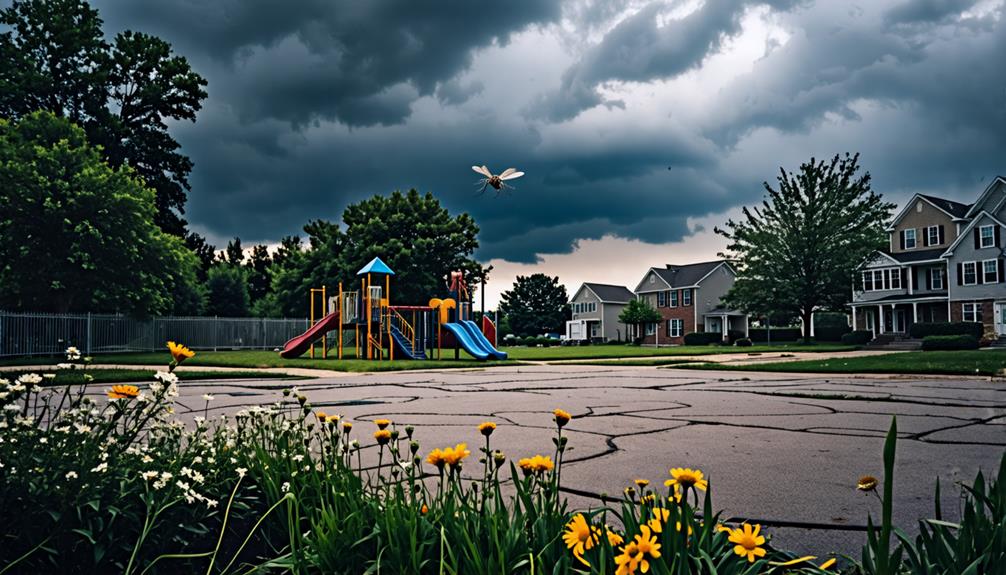
Tragedy has struck New Jersey as the West Nile Virus outbreak intensifies. Recent reports indicate eight confirmed cases, with seven linked to severe neurological complications, including encephalitis. Affected areas, particularly Bergen and Cumberland counties, are experiencing heightened mosquito activity and increased health risks. Public health officials are emphasizing preventative measures, such as using insect repellent and eliminating standing water, to combat this growing concern. Community engagement initiatives are essential, fostering awareness and encouraging proactive measures among residents. This evolving situation demands immediate attention and vigilance—understanding the full scope may reveal significant insights into managing this public health threat.
Current West Nile Virus Situation

Amid rising concerns over vector-borne diseases, New Jersey has reported six new cases of West Nile Virus (WNV), bringing the total for 2024 to eight confirmed infections. The virus has been associated with severe health complications, including neuroinvasive disease, with seven cases reported as encephalitis or meningitis. Symptoms identification is critical, as initial signs may include fever, headaches, and body aches, potentially escalating to more severe neurological symptoms. Treatment options primarily focus on supportive care; antiviral medications are not available for WNV. Public health officials stress the importance of early detection and prompt medical attention, particularly for older adults who are at higher risk. Vigilance and awareness remain essential as the state navigates this concerning outbreak.
Affected Areas in New Jersey
The recent surge in West Nile Virus (WNV) cases in New Jersey has prompted health officials to pinpoint the specific areas most impacted by the outbreak. Importantly, Bergen County has reported an increase in cases, contributing to the overall concern among residents. However, Cumberland County has emerged as a significant area of focus, as it is linked to two fatalities and several neuroinvasive disease cases. Health authorities are particularly vigilant in these counties, where increased mosquito activity has been documented. The geographical distribution of cases underscores the need for heightened awareness and monitoring, as officials work to mitigate the spread of the virus and protect public health across these affected regions.
Preventative Health Measures

Effective preventative health measures are essential in combating the ongoing West Nile Virus (WNV) outbreak in New Jersey. Key strategies include robust mosquito control initiatives and thorough health education campaigns. Residents are strongly advised to utilize insect repellent, wear long-sleeved clothing, and eliminate standing water around their homes, which serves as breeding grounds for mosquitoes. The New Jersey Department of Health (NJDOH) emphasizes vigilance during peak mosquito activity, particularly from mid-August to late September. Public health agencies are collaborating to disseminate crucial information regarding WNV transmission, symptoms, and prevention. By fostering awareness and encouraging proactive behaviors, New Jersey can mitigate the risks associated with this mosquito-borne illness, ultimately safeguarding public health and reducing the impact of future outbreaks.
Community Engagement and Awareness
Community involvement plays a pivotal role in addressing the West Nile Virus (WNV) outbreak in New Jersey. Effective community outreach initiatives are significant for disseminating critical information and mobilizing residents to take preventive action. Public education campaigns are being launched to inform citizens about the risks associated with WNV, emphasizing the importance of protective measures such as using insect repellent and eliminating standing water. Local health officials are collaborating with community organizations to foster a greater understanding of the virus and its transmission. Engaging residents through workshops and informational sessions not only raises awareness but also empowers communities to actively participate in mosquito control efforts. This collective vigilance is essential in mitigating the impact of the outbreak and protecting public health.
Frequently Asked Questions
What Are the Symptoms of West Nile Virus Infection?
Symptoms of West Nile Virus infection may include fever, headache, body aches, and, in severe cases, neuroinvasive diseases like encephalitis. Diagnostic tests identify the virus, while prevention strategies focus on mosquito control and personal protection measures.
How Is West Nile Virus Transmitted to Humans?
West Nile Virus is primarily transmitted to humans through mosquito bites, particularly from infected Culex species. Effective prevention measures include eliminating mosquito breeding sites and employing protective strategies to reduce exposure during peak activity periods.
Who Is at Higher Risk for Severe Illness?
Individuals aged 50 and older, along with those with compromised immune systems or underlying health conditions, constitute vulnerable populations at higher risk for severe West Nile Virus illness. Effective prevention strategies are essential to mitigate these risks.
Can Pets Get Infected With West Nile Virus?
Yes, pets can contract West Nile virus through infected mosquitoes. Implementing mosquito control measures and ensuring pet protection, such as keeping pets indoors during peak activity hours, can greatly reduce the risk of transmission.
What Should I Do if I Suspect Infection?
If you suspect West Nile Virus infection, promptly consult a healthcare provider. Discuss prevention measures and inquire about testing options to confirm the diagnosis, ensuring timely medical intervention and appropriate management of your health.







